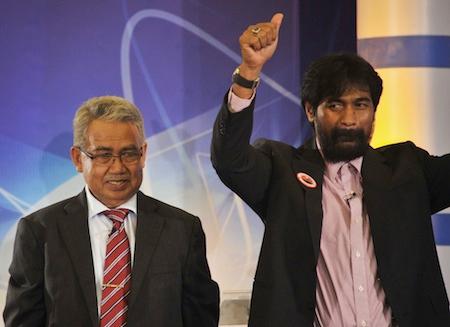Aceh elections: pure shariah? Or pure politics?
Aceh’s newly elected ex-rebel governor Zaini Abdullah, left, and his deputy Muzakir Manaf attending a debate in Banda Aceh, Indonesia.
In Aceh, arguably the most devoutly Islamic corner of Southeast Asia, voters have elected an ex-rebel governor vowing to embolden a more "pure" strain of Quranic shariah law.
Perhaps he will.
But while it's tempting to view all things Aceh through the shariah lens — it's the only Indonesian province where boozing and out-of-wedlock romance is punishable by public caning — this election isn't all about shariah.
It's all about power and settling vendettas.
Any politician hoping to win in Aceh has to pay lip service to upholding the piety of Quranic law. These appeals to Islamic purity have much in common with American senators' appeals to "family values." They're vague. They please the base.
The real significance of the election is that the core hirearchy of former Free Aceh Movement separatists, which waged a three-decade guerrilla war to establish Aceh as a sovereign country, has finally consolidated its power.
Post-election headlines highlight the fact that Aceh has just elected an "ex-rebel" governor. But both the unseated incumbent, Irwandi Yusuf, and the new governor, Zaini Abdullah, can boast of rebel bonafides.
The outgoing leader actually has a more compelling backstory. He was locked behind bars as a "war prisoner" in 2004 and survived Aceh's devastating tsunami by escaping through a crack in the roof of his jail.
Via Getty Photos, here's the recently unseated governor (in black) at a post-conflict weapons destruction ceremony in 2005.
![]()
The incoming governor, however, spent much of the rebellion living more comfortably as the movement's "foreign minister" living in Swedish exile.
But once the rebels gave up combat for politics following the tsunami disaster, Irwandi split from the pack, formed his own ex-guerrilla camp and bested his comrades at the polls.
He has been a thorn in the rebel leadership's side ever since. With his ouster, the Aceh Party has cemented its power with a majority in the Aceh House of Representatives and control of the governor's seat.
Will their rule benefit this tropical, highly orthodox region?
The International Crisis Group, one of the closer foreign observers of Indonesian politics, has called the Aceh Party an "autocratic, almost feudal party that brooks no dissent." The run-up to the election was marred by campaign rally attacks, arson and shootings deemed politically motivated by the central government. (Our elections explainer, "Aceh's Bloodstained Elections," is here.)
During a pre-election interview, Sidney Jones, an ICG analyst, surmised that an Aceh Party victory could limit the potential for post-voting violence. "But long term," she said, "it could encourage the mafia-like tendencies of some people in the party, especially if they're not held fully accountable."
Aceh is certainly experiencing a clash between new-wave modernity and old-school Islam, a conflict best illuminated by criminalization of ragtag Muslim punk rockers who I visited several months ago.
But the real post-election story isn't that a new leader claims he'll strengthen Islamic law.
The real development is that the central leadership of Aceh's defunct rebellion has, at last, assumed political control over a region they once fought to liberate.
Every day, reporters and producers at The World are hard at work bringing you human-centered news from across the globe. But we can’t do it without you. We need your support to ensure we can continue this work for another year.
Make a gift today, and you’ll help us unlock a matching gift of $67,000!
